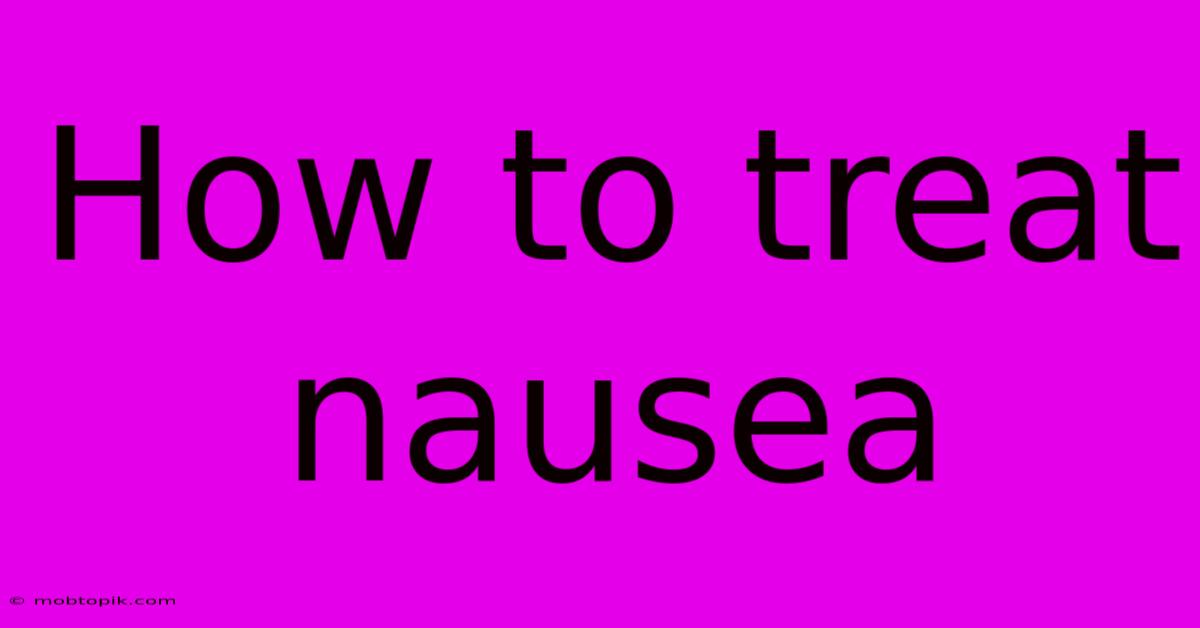How To Treat Nausea

Discover more detailed and exciting information on our website. Click the link below to start your adventure: Visit Best Website mobtopik.com. Don't miss out!
Table of Contents
How to Treat Nausea: A Comprehensive Guide
Nausea, that queasy feeling in your stomach, is a common ailment affecting people of all ages. It can range from a mild discomfort to a debilitating symptom, significantly impacting your daily life. Understanding the causes and employing effective treatment strategies is crucial for managing nausea effectively. This comprehensive guide explores various approaches to alleviate nausea, from simple home remedies to medical interventions.
Understanding the Causes of Nausea
Before diving into treatment, it's important to understand what triggers nausea. The causes are diverse and can include:
Gastrointestinal Issues:
- Indigestion: Overeating, eating too quickly, or consuming greasy or spicy foods can lead to indigestion and subsequent nausea.
- Food poisoning: Contaminated food can cause severe nausea, vomiting, and diarrhea.
- Gastroenteritis ("stomach flu"): Viral or bacterial infections affecting the stomach and intestines often manifest as nausea and vomiting.
- Irritable bowel syndrome (IBS): This chronic condition can cause various gastrointestinal symptoms, including nausea.
- Gastroparesis: Delayed stomach emptying can result in nausea and vomiting.
Other Medical Conditions:
- Migraines: Many migraine sufferers experience nausea as a prominent symptom.
- Motion sickness: Nausea triggered by movement, often experienced during car, sea, or air travel.
- Pregnancy: Morning sickness, a common occurrence during pregnancy, is characterized by nausea and vomiting.
- Infections: Various infections, including the flu and other viral illnesses, can cause nausea.
- Medication side effects: Many medications list nausea as a potential side effect.
- Inner ear problems: Disruptions to the inner ear's balance system can induce nausea.
- Anxiety and stress: Psychological factors can significantly contribute to nausea.
- Cancer and chemotherapy: Nausea is a frequent side effect of cancer treatment.
Effective Treatments for Nausea
The best approach to treating nausea depends on its underlying cause and severity. Here's a breakdown of effective strategies:
Home Remedies for Mild Nausea:
- Rest: Allowing your body to rest can help alleviate mild nausea.
- Hydration: Drink clear fluids like water, clear broths, or electrolyte solutions to prevent dehydration. Avoid sugary drinks.
- BRAT diet: The BRAT diet (bananas, rice, applesauce, toast) consists of bland foods that are easy to digest and can soothe an upset stomach.
- Ginger: Ginger has been used for centuries to combat nausea. You can consume it as ginger ale, ginger tea, or candied ginger.
- Peppermint: Peppermint tea or candies can also help relieve nausea for some individuals.
- Acupressure: Wristbands applying pressure to specific points (P6 points) are believed to help with nausea, especially motion sickness.
Over-the-Counter (OTC) Medications:
Several OTC medications can effectively relieve nausea:
- Antacids: These neutralize stomach acid and can help with indigestion-related nausea.
- Antihistamines: Certain antihistamines, such as dimenhydrinate (Dramamine), can be effective against motion sickness and other types of nausea.
- H2 blockers: These reduce stomach acid production and can be helpful for some types of nausea.
Important Note: Always follow the instructions on the packaging and consult a doctor or pharmacist if you have any concerns or pre-existing conditions.
Prescription Medications:
For severe or persistent nausea, a doctor may prescribe stronger medications, including:
- Anti-emetics: These medications specifically target the vomiting center in the brain and are highly effective for various causes of nausea, including chemotherapy-induced nausea. Examples include ondansetron (Zofran), promethazine (Phenergan), and prochlorperazine (Compazine).
- Other medications: Depending on the underlying cause, your doctor may prescribe other medications to address the root of the problem. For example, antibiotics for infections or medications to manage IBS.
Lifestyle Changes:
Certain lifestyle modifications can help prevent and manage nausea:
- Dietary adjustments: Avoid trigger foods that exacerbate your nausea. Eat small, frequent meals instead of large ones.
- Stress management: Practice relaxation techniques like deep breathing or meditation to reduce stress levels.
- Avoid strong smells: Certain odors can trigger nausea. Try to avoid areas with strong or unpleasant scents.
- Proper hydration: Staying adequately hydrated is crucial for overall health and can help manage nausea.
When to Seek Medical Attention
While mild nausea often resolves on its own, you should seek medical attention if:
- Nausea is severe or persistent.
- You experience vomiting that lasts more than 24 hours.
- You have bloody vomit or black, tarry stools.
- You experience severe abdominal pain.
- You have a fever or chills.
- You are unable to keep down fluids.
- You are pregnant and experiencing excessive vomiting (hyperemesis gravidarum).
Conclusion
Nausea can be a debilitating symptom, but understanding its causes and utilizing appropriate treatments can significantly improve your comfort and well-being. While many cases can be managed effectively with home remedies and OTC medications, persistent or severe nausea requires professional medical attention. Remember to consult a healthcare provider for diagnosis and personalized treatment recommendations, especially if your nausea is accompanied by other concerning symptoms. By proactively addressing nausea, you can regain control over your health and enjoy a better quality of life.

Thank you for visiting our website wich cover about How To Treat Nausea. We hope the information provided has been useful to you. Feel free to contact us if you have any questions or need further assistance. See you next time and dont miss to bookmark.
Also read the following articles
| Article Title | Date |
|---|---|
| How To Treat Food Poisoning | Nov 29, 2024 |
| Odi | Nov 29, 2024 |
| How To Treat Wounds | Nov 29, 2024 |
| How To Treat Tonsillitis | Nov 29, 2024 |
| How To Treat Headaches | Nov 29, 2024 |
